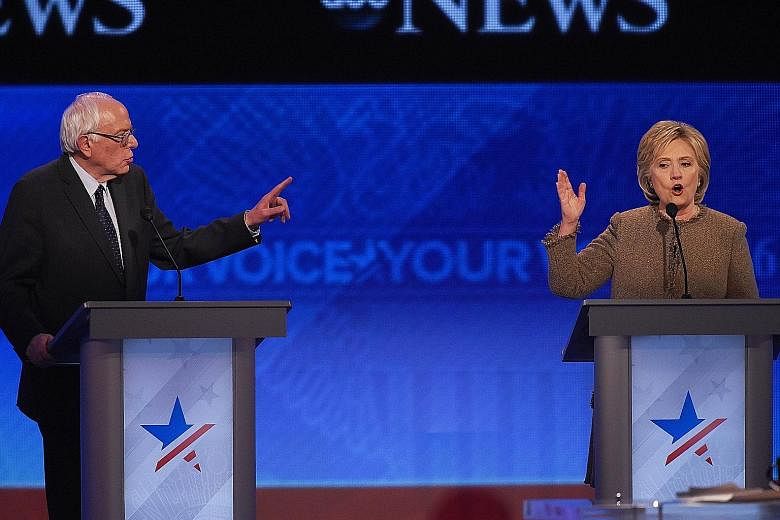The United States Democratic presidential debate last Saturday night saw candidates taking aim at Republican front runner Donald Trump, condemning his racist comments about Muslims while outlining their plans to defeat radical extremism.
Former secretary of state Hillary Clinton said Mr Trump was using "bluster and bigotry to inflame" Americans and went as far as calling him the "best recruiter" of the Islamic State in Iraq and Syria (ISIS).
Former Maryland governor Martin O'Malley said the US could rise to the challenge of ISIS if it "holds true to the values and the freedoms that unite us" instead of surrendering to "the fascist pleas of billionaires with big mouths".
This was the first Democratic debate since the Dec 2 San Bernardino terrorist attack that killed 14 people. The attack prompted Mr Trump to call for a temporary ban on Muslims travelling to the US, which led to international condemnation.
While domestic issues, from taxation to healthcare to education, were raised, terrorism and national security dominated the two-hour debate.
Mrs Clinton was pointed in her criticism, saying Mr Trump's rhetoric "is sending a message to Muslims here in the United States and literally around the world that there is a 'clash of civilisations', that there is some kind of Western plot or even 'war against Islam'", which then "fans the flames of radicalisation".
This was largely representative of her strategy to "pivot to the general election", said University of Michigan director of debate Aaron Kall.
"On numerous occasions, she deflected debate jabs, pointing out that the three Democrats on stage would all be superior to any Republican candidate," he said.
The candidates also weighed in on their plans to destroy ISIS, with Mrs Clinton calling not only to dismantle its networks but also to "work more closely with Muslim- American communities" at home.
"They will be our early warning signal," she said.
Mr O'Malley highlighted a lack of investment in "intelligence gathering, intelligence analysis and intelligence sharing", saying there is a need to "increase the battle tempo".
What the candidates disagreed on the most was probably the removal of Syrian President Bashar al-Assad. Vermont Senator Bernie Sanders proposed going after ISIS first and deemed getting rid of Mr Assad a "secondary issue".
Mrs Clinton disagreed, saying it was necessary to pursue a "political, diplomatic channel" in Syria to remove Mr Assad in order to get support on the ground to take out ISIS.
"We now have that. We have the UN Security Council adopting a resolution that lays out a transition path. It's very important that we operate on both at the same time."
Even so, political science assistant professor Jacob Neiheisel from the University of Buffalo said: "It doesn't seem like the Democratic candidates' proposed solutions to the problem differed all that much... I doubt very much any of the candidates were able to assure the American public on that issue."
The debate came a day after a data breach dispute broke out between the Clinton and Sanders campaigns. The Democratic National Committee has a database of voter information which campaigns pay to access. Due to a glitch, Mr Sanders' staffers were able to access Mrs Clinton's proprietary data.
During the debate, he apologised to the Democratic front runner, saying "this is not the type of campaign we run". She accepted the apology, dissolving any possible tension.
If Mrs Clinton's Democratic rivals sought to chip away at her support before the year draws to a close, they were largely unsuccessful. According to political website Real Clear Politics, Mrs Clinton has the support of 55.9 per cent of voters, compared with Mr Sanders' 30.8 per cent and Mr O'Malley's 3.7 per cent.
"Sanders and O'Malley failed to aggressively put Clinton on the debate ropes and didn't do enough to draw out policy contrasts... for the viewing audience," said Mr Kall.

